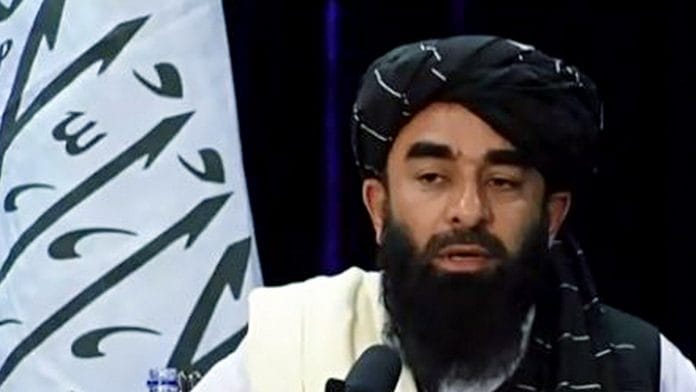New Delhi: Five years after the Doha agreement paved the way for the withdrawal of US forces from Afghanistan, the Taliban, in a shock move, last week said that they no longer consider the Doha pact valid.
“The Islamic Emirate has its own governance system and we are no longer moving forward according to that accord,” Zabihullah Mujahid, the Taliban’s chief spokesperson, told state-owned Kabul TV.
He added that the Taliban had met its primary obligation under the agreement by ensuring that Afghanistan did not serve as a launchpad for terrorist attacks against the US and its allies. He urged Washington to “take positive steps to engage with Afghanistan” and to assist in removing Taliban leaders from international sanctions lists.
Afghans, however, remain divided over the move. Experts and analysts are skeptical about the claims of the Taliban and are worried about the repercussions on citizens and the neighbouring regions as well.
Speaking to ThePrint, former education minister Mirwais Balkhi said the Taliban’s announcement could escalate tensions and potentially lead to a reduction in diplomatic engagement and foreign aid.
“One tangible consequence might be the suspension of critical international financial support, worsening Afghanistan’s already dire economic situation. The Taliban’s rejection of the agreement could also prompt the imposition of additional sanctions or other punitive actions, and international organisations might scale back or withdraw their operations, further isolating the country on the global stage,” he said.
Also read: Al-Qaeda’s last Indian soldier is imprisoned in Pakistan. Is the long jihad finally dead?
Taliban’s tall claims and concerns
Alongside the political changes brought about by the Taliban’s rule, the Doha Agreement, formally known as the US-Taliban Agreement, also revealed significant flaws, Balkhi said. Several key provisions of the agreement, including the Taliban’s obligation to sever ties with terrorist groups and reduce violence, were never fully realised.
“Recent reports suggest that the Taliban is increasingly moving away from the commitments made in the 2020 peace agreement with the United States, which was designed to promote an inclusive political structure and prevent Afghanistan from hosting international terrorist groups,” he said.
“This shift is raising fears of escalating violence and potential targets from Afghanistan spilling over to other regions. Such a development could lead to a severe humanitarian crisis, exacerbating the already fragile conditions for civilians,” he added.
Afghan journalist Sami Yousafzai agrees.
“The biggest concern for Washington remains counterterror specifically, ensuring that the Taliban do not allow Al-Qaeda or other extremist groups to operate freely,” Yousafzai told ThePrint.
“So far, the US appears somewhat satisfied, likely because of the Taliban’s occasional actions against ISKP and their claim that Al-Qaeda has no operational presence. However, there are still reports suggesting that Al-Qaeda maintains connections within the Taliban, just in a more discreet manner,” he added.
While no country has formally recognised the Taliban’s government, it has established a regime led by its clerical leadership. Domestically, the group has implemented harsh policies that severely restrict the rights of Afghan women, including bans on education, employment and mobility.
Yousafzai pointed out that the Taliban has also disregarded the agreement’s promise to form an inclusive government.
“Their cabinet remains overwhelmingly Pashtun, dominated by Taliban loyalists, with no meaningful representation of other ethnic groups or political factions,” he added.
India and the neighbours
Gautam Mukhopadhyay—a former Indian ambassador to Afghanistan, Yemen and Syria—noted that India largely stayed out of the Doha negotiations, opting instead for a pragmatic approach.
“India’s dealings with Afghanistan are focused on humanitarian concerns and maintaining bilateral channels for relief and communication with the Afghan people,” Mukhopadhyay said.
He added that the current political climate, particularly the volatility caused by the Trump administration’s foreign policy, will continue to influence how countries engage with the new Afghan regime.
Other analysts agree. Most note that the agreement was flawed from the outset, caught in the political transition between the Trump and Biden administrations, with neither fully committing to its implementation.
But it signals a strategic shift—the Taliban is shifting focus from maintaining diplomatic ties with the US to securing sanctions relief and building economic partnerships elsewhere.
“The critical question now is what the Taliban is using as leverage instead. Their reluctance to reaffirm counterterrorism commitments to the international community suggests they may be turning to alternative sources of support, reducing their dependence on US legitimacy or pressure. This development raises significant concerns not only for Afghanistan but also for regional and global security,” Sara Wahedi, CEO of Civaam, a civic technology start-up in Kabul, told ThePrint. Wahedi is also the founder of Ehtesaab, Afghanistan’s first and only citizens engagement platform.
Like Abu Mohammed al-Golani of the Hayat Tahrir al-Sham rebranded himself as a political actor, the Taliban may attempt a similar strategy, she said.
However, their oppressive policies, especially towards women and minorities, remain a major obstacle. Despite claims of reduced terrorism, Afghanistan is increasingly becoming a breeding ground for extremism, with the Taliban leveraging uncertainty to strengthen their position, Wahedi notes.
“If Doha temporarily delayed that reality, it is now unravelling in real-time. The Taliban understands this uncertainty can be weaponised. Meanwhile, the most vulnerable populations in Afghanistan, particularly women and marginalised groups, continue to suffer as the world looks on,” she said.
(Edited by Sugita Katyal)
Also Read: Al-Qaeda’s last Indian soldier is imprisoned in Pakistan. Is the long jihad finally dead?






